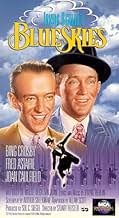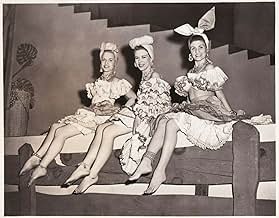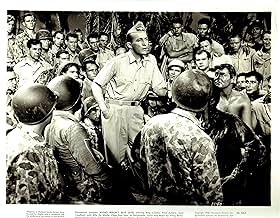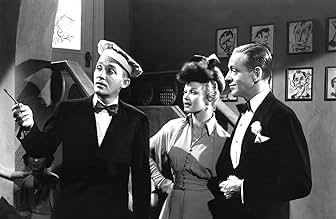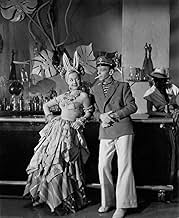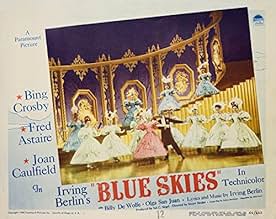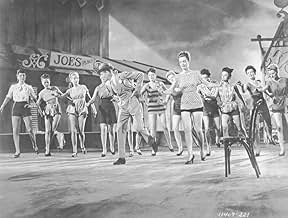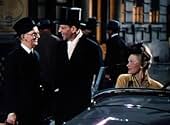Füge eine Handlung in deiner Sprache hinzuAn ex-dancer and New York radio star narrates his love story for a band singer who loved a self-centered man who was unable to commit to his nightclub business or his family.An ex-dancer and New York radio star narrates his love story for a band singer who loved a self-centered man who was unable to commit to his nightclub business or his family.An ex-dancer and New York radio star narrates his love story for a band singer who loved a self-centered man who was unable to commit to his nightclub business or his family.
- Regie
- Drehbuch
- Hauptbesetzung
- Für 2 Oscars nominiert
- 3 Gewinne & 3 Nominierungen insgesamt
- Dancer
- (Nicht genannt)
- Dolly
- (Nicht genannt)
- Dancer
- (Nicht genannt)
- Flapper
- (Nicht genannt)
- Dancer
- (Nicht genannt)
- Restaurant Patron
- (Nicht genannt)
- Dancer
- (Nicht genannt)
- Dancer
- (Nicht genannt)
- Showgirl
- (Nicht genannt)
Empfohlene Bewertungen
Astaire has three of his four dance numbers in the first half of the movie. One of them, "Puttin' On The Ritz," is one of the most impressive performances, if not THE best, he's ever done. It is absolutely spectacular. The movie is worth seeing for that performance alone. For the next hour, there is a romance gone sour and Crosby's crooning (some good songs, some bad).
The film's intent was to pay tribute to Irving Berlin and all the music he gave us, and it succeeds on that level. There are nothing but nice people in the movie and tons of music.....but the whole thing lacks something.
In common tradition to many 1940s movies, most commonly found in the "film noir" genre, BLUE SKIES is told in flashback, starting in modern day setting at a radio station, Broadcast Network of America in New York City's Rockefeller Center, where Jed Potter (Fred Astaire), a former dancer now a radio personality, relates his life story and career to his listeners, a story with a beginning but without a finish. Dating back circa 1919 following World War I finds Jed attracted to Mary O'Hara (Joan Caulfield), a girl, a "very pretty girl," working in the chorus. He invites her to accompany him for dinner at a night club owned by Johnny Aams (Bing Crosby), his Army buddy. Almost immediately, Mary is attracted to Johnny, but in spite of Jed's warning that Johnny is not the marrying kind, she cannot resist him. Johnny and Mary marry, and during their union have a daughter, Mary Elizabeth (Karolyn Grimes). All goes well until Mary finds that Jed is right in his assumption of Johnny being selfish and unstable, buying and selling nightclubs (oneof them called "Top Hat") at a moment's notice, and unable to settle down at in one place they could call home. After their divorce, Mary becomes engaged to Jed. Finding she's unable to marry Jed, Mary disappears, leaving Johnny as well as Jed, through his narration, to wonder whatever became of her.
As Jed Potter relates his "album of Irving Berlin songs" to his radio listeners, movie viewers get to to be treated to see and hear such classic tunes including: "A Pretty Girl is Like a Melody" (sung by chorus, danced by Fred Astaire); "I've Got My Captain Watching for Me Now" (Sung by Bing Crosby); "You'd Be Surprised" (sung by Olga San Juan); "All By Myself" (Crosby); "Serenade to an Old-Fashioned Girl" (sung by Joan Caulfield); "Puttin' on the Ritz" (Astaire); "I'll See You in C.U.B.A." (Crosby); "A Couple of Song and Dance Men" (Astaire and Crosby); "You Keep Coming Back Like a Song" (Crosby); "Always" (chorus); "Blue Skies," "The Little Things in Life," "Not for All the Rice in China" (all sung by Crosby); "Russian Lullaby" (Chorus); "Everybody Step" (Crosby); "How Deep is the Ocean" (chorus); "Running Around in Circles" (Crosby); "Heat Wave" (sung by Olga San Juan/danced by Astaire); "Buy Bonds Today" "This is the Army" "White Christmas" and "You Keep Coming Back Like a Song" (all sung by Crosby). "Mandy" and "Some Sunny Day" are those other songs heard as background music.
Astaire's "Puttin' on the Ritz" number, where he dances to eight images of himself, is one of the great highlights. First introduced by Harry Richman for the 1930 musical, PUTTIN' ON THE RITZ, the original lyrics have been changed to fit the Astaire style as well as the changing of times. Crosby and Astaire also provide fine moments with their joint collaboration as "A Couple of Song and Dance Men." Billy De Wolfe supplies much of the comedy relief as Johnny's partner and assistant. Aside from being the love interest to Olga San Juan, he does a five minute one man comedy routine as Mrs. Murgatroyd.
While the story tends to get corny at times, it does get better with its passage of time and its assortment of fine songs. Aside from Crosby's singing, his sentimental moment where he meets with his little girl (Grimes) again is well done, along with Astaire's dancing, which is always first rate. He briefly breaks away from his traditional character where he becomes a troubled dancer who turns to liquor after being jilted. Legend has it that BLUE SKIES was originally intended to become Astaire's farewell movie. Fortunately, after his two year retirement, he was lured back to the screen for more musicals, dramas and everything else through 1981. Joan Caulfield, then new to the movies, would work again with Crosby in WELCOME STRANGER (1947), an underrated drama with songs. Crosby and Astaire wouldn't work together again until being reunited again for their TV special, "A Couple of Song and Dance Men" (CBS, 1974)
Formerly presented on American Movie Classics (1994-1999) and later Turner Classic Movies (where it premiered February 18, 2007), BLUE SKIES, distributed on video cassette in 1997, is also available on a DVD package double featured with Crosby's other musical, BIRTH OF THE BLUES (1941). Although BLUE SKIES is not as memorable as HOLIDAY INN, they can be summed up as being two different movies with similar storyline as well as the memory of all that. (***1/2)
His retirement didn't last too long (he spent time with his race horses)as Gene Kelly called saying he had broken his foot playing football, and Fred came back to film work in Easter Parade.
There was to be a third paring of Crosby and Astaire in White Christmas, but Fred had other commitments, that's when Danny Kaye was brought in. Both Astaire and Crosby made their last recording together in the early 1970's called, "A Couple of Song and Dance Men". When they started to record the album, one of them remarked this was the first time they had worked together since Blue Skies. It was their last recording date as Crosby died shortly after, and Astaire never made other recordings.
Blue Skies does suffer from a rather tired and over corny story, and it also feels rather thin with a romance that felt like filler and not much else. Joan Caulfield is both incredibly bland and sometimes annoying in a very underwritten part, and the comedy was patchy. In fact, a lot of the comedy falls as flat as a lead balloon and this is not helped by the overplaying of Billy De Wolfe(though he has his moments). And as good as Bing Crosby is, he comes over as rather stiff and clumsy in his acting here, which is a shame as he has shown a lot of natural presence and likability before.
The film looks great however, with some very clever photography in the Puttin' On the Ritz scene and charming costumes and sets. Irving Berlin's songs are marvellous, the Oscar-nominated You Keep Coming Back Like a Song and the unforgettably energetic Puttin' On the Ritz being the standouts, Blue Skies is a beautiful song too. The score is lush and whimsical. Every bit as good as the songs is the characterful and graceful choreography, the truly outstanding number being Puttin' On the Ritz, the whole scene is spectacular and one of Astaire's most classic routines. Crosby sings absolutely beautifully and Olga San Juan brings fire and charm to a rather one-dimensional part with her particularly shining in the Latin rhythm duet I'll See You in Cuba with Crosby, but other than Puttin' On the Ritz, it's the divine dancing and performance of Fred Astaire that makes Blue Skies worth watching.
All in all, decent film but with the likes of Crosby, Astaire and Berlin involved you expect more than just decent. 6/10 Bethany Cox
And there's the added treat of music by one of the legendary composers. Irving Berlin provides his beautiful songs, including the Oscar-nominee "You Keep Coming Back Like a Song." Fred Astaire does his famous "Puttin on the Ritz" number, while Bing sings the title tune. The duo work well together as they did on "Holiday Inn" four years earlier.
Billy De Wolfe has some funny moments in songs and sketches.
Overall, a colorful and entertaining musical. Don't listen to those who'd turn you away just because the plot is kinda thin.
What more could you want?
Wusstest du schon
- WissenswertesAfter Fred Astaire announced his retirement before completing this film, New York's Paramount Theater generated a petition of 10,000 names to persuade him to come out of retirement.
- PatzerAt the beginning of the movie, which is just after World War I, the Crosby character tells the De Wolfe character to do his Frankenstein routine. The Frankenstein character he does is based on Boris Karloff's 1931 version which some ten years or so in the future. At that time in the movie Frankenstein was just a creature in Mary Shelly's book.
- Zitate
Jed Potter: Song and Dance Man.
Johnny Adams: Song and Dance Man, that's right.
Jed Potter: He didn't remember it then, how could he know it now?
Johnny Adams: Oh, get out, I bet I could do it right now, the whole thing.
- VerbindungenFeatured in Dick Cavett Show: Fred Astaire (1970)
- SoundtracksA Pretty Girl Is Like a Melody
Words and Music by Irving Berlin (1919)
Sung by Fred Astaire
Danced by Fred Astaire, Joan Caulfield, chorus
Top-Auswahl
- How long is Blue Skies?Powered by Alexa
Details
- Erscheinungsdatum
- Herkunftsland
- Sprachen
- Auch bekannt als
- Blue Skies
- Drehorte
- Produktionsfirma
- Weitere beteiligte Unternehmen bei IMDbPro anzeigen
Box Office
- Budget
- 3.000.000 $ (geschätzt)
- Laufzeit1 Stunde 39 Minuten
- Seitenverhältnis
- 1.37 : 1


